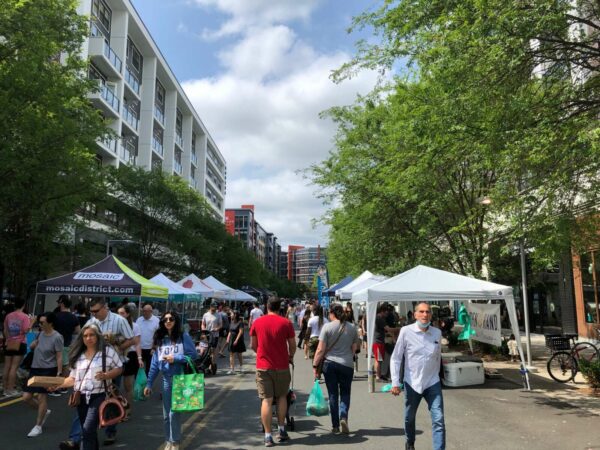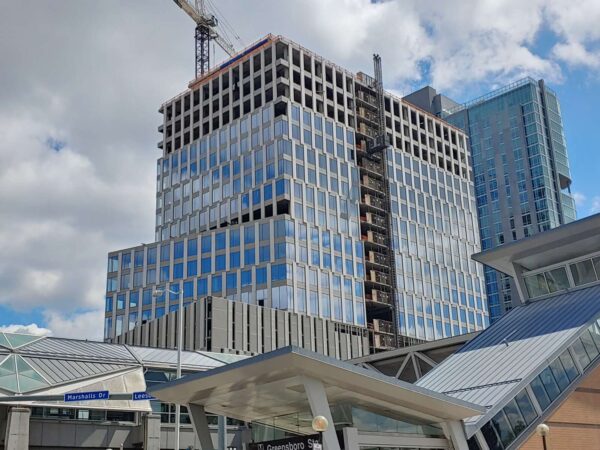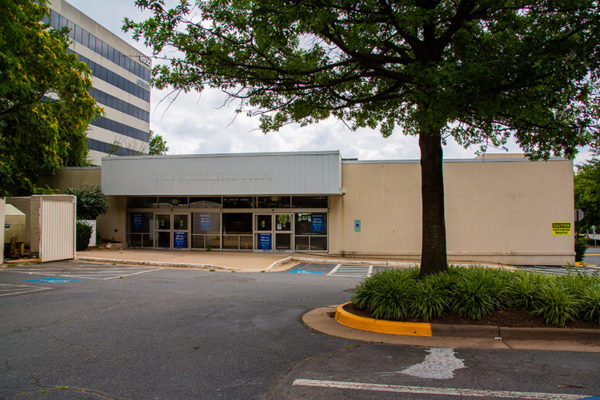
Fairfax County is continuing its efforts to transition to renewable energy with the installation of solar panels on county government and public school buildings, but it will now do so with a different vendor.
The county ended its contract with the company Sigora Solar yesterday (July 1), about 18 months ahead of schedule.
Sigora Solar is one of three vendors awarded contracts to install, manage, and maintain solar energy infrastructure for county government and school buildings in December 2019, when Fairfax County announced what it said was the largest solar power purchase agreement initiative by a Virginia locality to date.
The original contracts with Sigora, Sun Tribe Solar, and Ipsun Power were set to run through Dec. 31, 2022.
However, the county amended its contract with Sigora on June 10 to state that it would be “terminated for convenience” effective July 1. Sigora was designated as the primary contractor for roof-mounted solar panel projects.
Moving forward, the county will now work with Sun Tribe Solar, the secondary contractor for roof-mounted panels and the primary contractor for carport or canopy-mounted panels.
“Under the terms of the agreement, the county leases space on its buildings for the companies to install solar panels that those vendors will own, and the county buys the energy generated by the panels at a fixed price,” Brian Worthy, a public information officer with Fairfax County’s Office of Public Affairs, said.
“However, these companies have the right to decide whether or not to install panels at any buildings identified by the county,” Worthy said. “During the past year and a half, the county selected 30 buildings for solar panels, and we are eager to move forward with these projects.”
The Fairfax County Board of Supervisors has approved leasing necessary roof space at two batches of county-owned properties so far. The first round of eight sites came on Oct. 20, 2020, and another 22 sites were added on March 9.
The sites approved for solar panel installations in the Tysons area are:
- McLean Government Center and Police Station (1437 Balls Hill Road, McLean)
- Wolf Trap Fire Station #42 (1315 Beulah Road, Vienna)
- McLean Community Center (1234 Ingleside Avenue, McLean)
- Thomas Jefferson Library (7415 Arlington Blvd., Falls Church)
- Providence Community Center (3001 Vaden Drive, Fairfax)
- Merrifield Center and Kerrifield Center Garage (8221 Willow Oaks Corporate Drive, Fairfax)
Under the solar power purchase agreements, the installed solar panels will be owned, operated and maintained by the contracted vendors, rather than the county. The county will simply purchase electricity produced by these panels over time.
When the contracts were announced in 2019, the county estimated that the initiative could potentially yield over $60 million in electricity cost avoidance over the terms of the contracts. Additionally, it was projected that approximately 1.73 million megawatt hours of renewable energy could be generated at the county’s facilities.
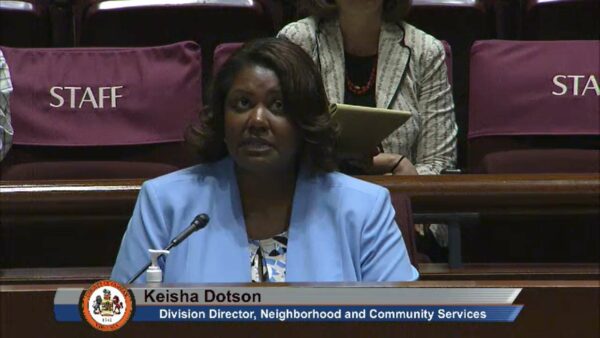
With a federal moratorium on evictions set to expire at the end of July, Fairfax County officials are preparing for a surge in evictions and accompanying demand for rental assistance and other social services.
Even with various federal and state protections in place during the COVID-19 pandemic, 599 writs of eviction and 1,411 unlawful detainers were issued to Fairfax County residents between June 2020 and 2021, according to an Eviction Data Dashboard created by county staff.
Presented to the Board of Supervisors during its health and human services committee meeting on Tuesday (June 29), the dashboard map indicates that the residents at risk of being evicted tend to be concentrated in neighborhoods of color and ones that have been hit hard by the novel coronavirus, Fairfax County Housing and Community Development Deputy Director Tom Barnett told the board.
As of June 14, residents of the 22306 zip code in Alexandria have been issued 54 writs of eviction — court notices directing the Fairfax County Sheriff’s Office to remove a tenant’s belongings from the property — the most of any zip code in the county.
That zip code has also recorded 3,641 COVID-19 cases, which translates to 11,263 cases per 100,000 people, the highest rate in the county. Within that zip code, eviction notices have been clustered south of Groveton and around Woodley Hills, census tracts with relatively high Black and Hispanic/Latino populations.
The Alexandria area in general has been particularly affected by housing instability during the pandemic with 159 writs of eviction issued, more than twice as many as any other part of the county. Falls Church comes in second with 73 writs issued.
Alexandria and Falls Church have also seen the most unlawful detainers, which are issued when a landlord seeks court assistance in removing a tenant from their property.
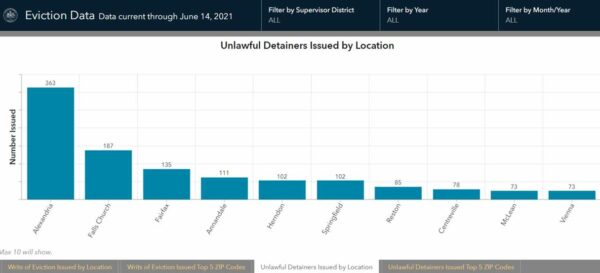
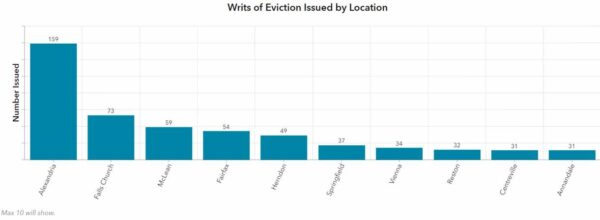
There are some exceptions to the overall correlation of eviction notices and COVID-19 cases. The 22102 zip code, which includes Tysons, saw writs of eviction issued — the second most in the county — but it has also reported a relatively low rate of 5,481 COVID-19 cases per 100,000 people.
Fairfax County Health and Human Services staff put together the dashboard using real-time information obtained from the Fairfax County Sheriff’s Office and General District Court, thanks to a partnership that the agencies formed last summer in response to the pandemic.
“We’re using this data and other data that is available to the county to target our outreach and our rental assistance,” Barnett said. Read More
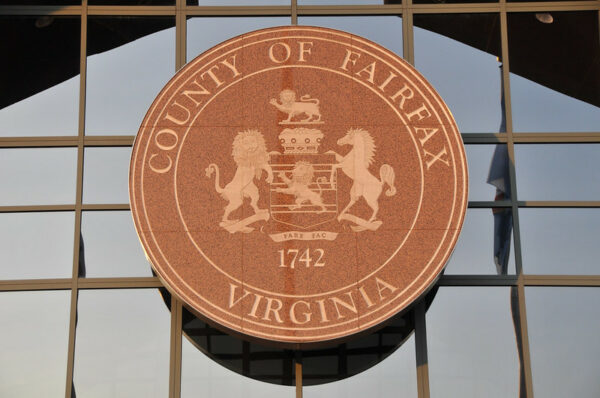
The Fairfax County Board of Supervisors is working its way toward letting public workers collectively bargain in the wake of a statewide change in 2020 to lift a decades-old restriction.
A board’s personnel committee met yesterday (Tuesday) to discuss a draft ordinance that would let Fairfax County workers make union contracts with the county government, giving them the power to negotiate pay and other benefits.
“I think we’re moving in a good direction,” Dranesville District Supervisor John Foust said after sharing concerns that the proposed ordinance might exempt too many employees from collective bargaining.
While managers, supervisors, volunteers, and other workers are slated to be excluded under the draft ordinance, the board is looking at where temporary workers such as summer lifeguards and seasonal park workers as well as non-merit employees should fall.
The proposed ordinance would serve as the framework for what can and can’t be done through collective bargaining. Once approved, it would allow workers to vote to form a bargaining unit, and employees who don’t want to be involved wouldn’t have to pay dues but could still receive the benefits of the change, Mason District Supervisor Penny Gross said.
The draft discussed Tuesday calls for collective bargaining agreements that would last three years or longer, with separate units for general government employees, police, and fire and emergency services. It also bans strikes and spells out numerous other issues.
The county’s ordinance would be separate from Fairfax County Public Schools, which has over 24,000 employees.
Gross, who chairs the personnel and reorganization committee that’s overseeing the development of the draft, said she expects the board will pass an ordinance, which could happen this year.
SEIU Virginia 512, a union that already includes over 2,000 members in Fairfax County from dues-paying maintenance workers and nurses to librarians and social workers, welcomed the board’s overall support.
But union president David Broder says the ordinance still falls short in several areas. Namely, he says it “artificially narrows” the scope of bargaining, excludes working conditions among the topics that can be negotiated, and could potentially leave thousands of workers out of the collective bargaining process.
“We’ve learned during the pandemic…that being able to bargain over working conditions is critical,” Broder said, noting the importance of safe and clean work sites, personal protective equipment availability, and scheduling.
Lee District Supervisor Rodney Lusk shared concerns about working conditions for public works and sanitation workers, expressing support for change.
Collective bargaining agreements could involve some 10,000 workers, Gross told Tysons Reporter, and the board is gathering more information on non-merit employees to help with its determinations.
“We have one opportunity to get this right, which is why we’re taking a little extra time to work on the ordinance,” Gross said.
In 1977, the Supreme Court of Virginia ruled that public-sector collective bargaining agreements weren’t permitted and existing ones were invalid, noting the state legislature could change that.
The General Assembly and governor approved legislation last year that gave localities the authority to develop ordinances for recognizing labor unions and permitting collective bargaining. That measure took effect on May 1.
The personnel committee will meet again on July 20, and the board expects to have a public hearing in October.
Photo via Machvee/Flickr
Homeowners seeking to rent out their basements or other parts of their residence as well as renters and neighborhoods concerned about parking will soon have new rules aimed at helping them.
A revised zoning code for Fairfax County, the first overhaul in around 40 years, becomes effective Thursday (July 1).
In addition to updating the county’s regulated uses with new options like live-work developments and solar farms, the new ordinance loosens some restrictions around accessory dwelling units — independent residential units that share a property with a main dwelling. But zoning officials say they expect a modest increase in homeowners converting parts of their property for other people.
Adopted in March, the new rules replace existing standards for ADUs — now dubbed accessory living units or ALUs — from 1978 and 1983, drop requirements that the occupant of the revamped space have a disability or be 55 years or older, and add parking requirements.
While the changes inspired some strong opinions from community groups, their impact is expected to be relatively small: Fairfax County approved 12 accessory unit applications in 2019, seven in 2020, and two so far this year as of Friday.
County staff previously noted there have been community concerns over whether the code is being enforced. A burdensome special permit approval process also may have been creating problems, the county said.
“Others may be installing ALUs anyway, but then perhaps they’re more likely to be unpermitted construction without the benefit of the permits and inspections,” Carmen Bishop, assistant zoning administrator, said in January before the Fairfax County Planning Commission. “So a less burdensome process may result in better compliance.”
People who have wanted such changes have had to go through a hearing, a process where neighbors could weigh in. Under the new rules, a property owner can add an interior ALU with just an administrative permit instead if they meet certain requirements.
That includes a new measure that adds an extra parking spot in off-street parking. Whether or not there’s an accessory living unit, a detached single-family house on a public street must have two off-street parking spaces or — if it’s on a private street — three off-street spots, according to the county.
“When a house has an ALU, one additional parking space will be required, which means, homes on public streets will need three off-street spaces and homes on private streets will need four off-street spaces to meet the zoning ordinance standard,” Leslie Johnson, the zoning administrator for the county’s Department of Planning and Development, said in an email Friday.
The new standards come as the county’s population exceeds 1.1 million people after rising by over 100,000 people every decade from 1980 to 2010, according to census data.
With housing prices expected to continue rising, proponents of the ALU rule changes argue that they will provide more flexibility for residents who want to stay in the county but can’t afford to live on their own.
Earlier in June, the Fairfax County Redevelopment and Housing Authority approved a change that made it easier for certain people in a first-time homebuyers program to rent a portion of their owner-occupied homes after a resident made a request.
The switch applies to 38 units and makes the authority’s policy consistent with all other units in county homebuyer programs, county spokesman Benjamin Boxer said in an email.
“Those owners may rent a portion of their home as long as they continue to occupy the property as their primary residence,” Boxer said in an email. “It is worth noting that, historically, we have rarely received any requests from our participating homeowners to rent portions of their homes.”
Courtesy Jeremy Levine/Flickr

The Weekly Planner is a roundup of interesting events coming up over the next week in the Tysons area.
We’ve searched the web for events of note in Tysons, Vienna, Merrifield, McLean, and Falls Church. Know of any we’ve missed? Tell us!
Tuesday (June 29)
- Planet Art: The Crossroads of Nature, Culture and Design (Online) — 7 p.m. — Join Creative Cauldron sets and costumes designer Margie Jervis for this encore crafts presentation that explores Indonesian art forms, including textile design, puppetry, theater, dance, and architecture. Email [email protected] for the Zoom link.
Thursday (July 1)
- Fifty Years Together: A Celebration of Wolf Trap — 8 p.m. at Filene Center (1551 Trap Rd.) — Join Wolf Trap and the National Symphony Orchestra in celebrating 50 years since Wolf Trap opened its doors. The musical evening will recall Wolf Trap’s historic opening and pay homage to the park’s founder, Catherine Filene Shouse. Tickets start at $47 and advance registration is required.
- Summer Live Music Featuring Justin Trawick — 5:30-8 p.m. at The Boro (8350 Broad St.) — This week’s live music series at The Boro features local musician Justin Trawick. RSVP to receive more information.
- Films in the Park — 7:30-9:30 p.m. at Strawberry Park (2910 District Ave.) — The Mosaic District continues its Films in the Park series this Thursday with Footloose, the 1984 classic starring Kevin Bacon and Lori Singer. Grab your picnic blanket and join your neighbors at Strawberry Park for a movie night!
- Concerts in the Park: Flowerbomb — 7-9 p.m. at Cherry Hill Park (312 Park Ave.) — This week’s Concert in the Park in Falls Church features D.C. four-piece band Flowerbomb. They’ll be playing songs from their debut album “Pretty Dark,” which was released in December 2020. Email [email protected] with questions or concerns.
Friday (July 2)
- Sweeney Todd at Wolf Trap — 8 p.m. at the Filene Center (1551 Trap Rd.) — Wolf Trap Opera’s second in-person show of the season is Stephen Sondheim’s “Sweeney Todd: The Demon Barber of Fleet Street,” which also has a Saturday performance. Tickets will be sold in socially distanced pods of 2 to 8 tickets. No single tickets are available. Listen to the pre-show lecture or read the insider guide for more information.
Saturday (July 3)
- 15th Amendment Concert & Festival — 6-8 p.m. at Vienna Town Green (144 Maple Ave.) — The Town of Vienna and the Vienna Presbyterian Church host a showcase of community musicians performing justice-themed songs. There will also be food, booths, voter registration and more for guests to enjoy!
Sunday (July 4)
- July 4th Drive-Thru Ice Cream Celebration — 11 a.m.-2 p.m. at McLean Community Center (1234 Ingleside Ave.) — Celebrate Independence Day with the McLean Community Center! In-district residents are invited to enjoy music, free ice cream, and patriotic giveaways with their neighbors. Residents are asked to sign up for a morning, midday or afternoon timeslot before they arrive.
- Declaration Celebration Scavenger Hunt — 9 a.m.-6:30 p.m. — The City of Falls Church Recreation and Parks Department is hosting a city-wide scavenger hunt to celebrate Independence Day. Find 13 historical markers throughout the city and win a free “Declaration Celebration” t-shirt by turning in your Scavenger Hunt Form at Cherry Hill Park or the community center, or emailing [email protected]. There will also be live music from Sudden M Pac Band from 4:30 to 6 p.m. at Cherry Hill Park. Due to construction at Meridian High School, there are no fireworks this year.
- Vienna July 4th Celebration — 7-9 p.m. at Yeonas Park (1319 Ross Dr. SW) — The Town of Vienna invites all residents to come out to celebrate July 4th! Music, food and drinks will be available, but guests are asked to leave their pets at home.
Photo via Sheri Hooley on Unsplash
Save those rotting veggies and bits of meat left over from last night’s dinner, because Fairfax County is expanding its composting program.
As of yesterday (Wednesday), residents can now bring their food scraps to four county farmers markets for composting. The locations include the Mosaic District Farmers Market, which operates year-round from 9 a.m. to 2 p.m. on Sundays.
Food scrap composting turns waste into a resource. Those wrinkling carrots or uneaten bread crusts can be transformed over time into natural fertilizer, putting nutrients back into the soil.
Proper composting can also prevent food waste from ending up in landfills and streams, taking up space and potentially damaging the ecosystem.
“The county is working to divert as much waste from disposal as possible,” Fairfax County Department of Public Works spokesperson Sharon North said in an email. “In the past few years, we have focused on glass recycling and reducing contamination to improve single stream recycling…Providing food scraps drop off locations will help divert this compostable material from disposal.”
North says food scraps can account for as much as 20% of waste, but nearly all of it can be composted, including meat, bones, dairy, vegetables, fruit and bread.
Some food-related paper products, such as paper plates, paper towels, and napkins, can be composted as well, as long as there’s no cleaning products or bodily fluids on them. Plastic bags, dryer sheets, yard waste, fats, oils, grease, tin foil, and foam containers, however, should never be composted.
Fairfax County first implemented a composting pilot program in November 2020 at two larger locations: the I-95 Landfill Complex in Lorton and I-66 Solid Waste Transfer Station in Fairfax.
North says the initial pilot program was a success, prompting county leaders to discuss options for an expansion.
“One of the main things we learned is that our residents are willing to separate out food scraps and bring them to compost drop off locations,” she writes.
The I-95 landfill and I-66 transfer station will remain permanent composting drop-off sites. The four farmers markets that are now part of the program’s expansion were specifically chosen due to their accessibility and central locations within the county.
Three of the chosen markets are seasonal and managed by the Fairfax County Park Authority. The Mosaic District farmers’ market is a year-round, private market operated by FreshFarm.
“Making locations more accessible throughout the county at Farmers Markets will allow for more opportunities to drop off food scraps for composting rather than having that material in the trash,” North said.
The compost program is expected to cost the county an estimated $50,000 annually.
The Fairfax County Economic Development Authority will soon add two new seats to its seven-member commission, which has remained the same size since it was created in 1964.
Virginia legislators and the governor approved a measure earlier this year allowing the change, which takes effect July 1 and will help meet diversity needs, officials say.
Charged with helping the county attract, retain, and support businesses, the FCEDA commission consists of local business and community leaders appointed by the Fairfax County Board of Supervisors.
FCEDA Chair Cathy Lange says the expanded board will help the authority bring different viewpoints to the table after the county has changed and grown over the past 57 years.
“We need a richness of perspectives to help the FCEDA understand why companies start here, grow here and stay here,” Lange said by email. “This diversity of needs also is directly tied to our understanding and support of talent attraction and retention. The companies want and need a broad and diverse talent pool, and we have to connect the talent to the companies.”
According to Lange, the EDA board hopes to further diversify representation of emerging and growing business sectors, such as financial services, cyber, cloud, and data analytics, as well as entrepreneurs and small business leaders “building the next base” of companies.
“At the same time, we can identify leaders who are reflective of the growing diversity in our county and its business community,” Lange wrote.
In its legislative agenda for the General Assembly’s 2021 session, Fairfax County noted the authority was created by state law in 1964, allowing the county to appoint seven board members.
“That number has not changed in the 50 years since the FCEDA was created, though Fairfax County has changed substantially during that time,” Fairfax County officials said in the report, which was adopted on Dec. 1.
In the legislative agenda, officials noted that the county’s increasing diversity extends to its economy:
The County has experienced tremendous growth, as has the local economy — the number and size of companies has increased, and businesses have expanded into new and diverse industry sectors. Increasing the size of the FCEDA board could further diversify participation from the County’s business community, while maintaining focus on the County’s traditional business base (including government contracting and IT services).
Among its services, the authority helps businesses find office space in the county, assists with special tax-exempt bonds for companies and nonprofits, and aids international firms seeking office space in Fairfax County.
While headquartered in Tysons, the authority has offices around the country and the world, including in Germany, India, Israel, South Korea, and the U.K. as well as Los Angeles.
Lange said in the email that Fairfax County is an amazing success story, and expanding the commission will help to ensure that continues.
“Understanding what different companies need to succeed here helps us to inform county leaders on what policies and programs need to be implemented to continue our success,” Lange wrote. “This also will help us understand how to market the county to businesses that want opportunities to grow and success, and how to market the region to talent.”
FCEDA vice president of communications Alan Fogg said by email that he expects there will be movement around appointments starting next month.
After being adapted for emergency uses during the COVID-19 pandemic, the former Container Store in Vienna could undergo another transformation.
The vacant storefront at 8505 Leesburg Pike near the Greensboro Metro station could be used by the Tysons Partnership and Celebrate Fairfax, Fairfax County Department of Economic Initiatives Director Rebecca Moudry told Tysons Reporter.
The building is 19,260 square feet in size and has approximately 95 parking spaces. The Container Store previously used the space before relocating to 8459 Leesburg Pike in 2018.
The county acquired the space in 2019 for $16.6 million with the hopes of using it to support innovation and entrepreneurship and create a vibrant destination for residents and visitors. Those goals remain and could be realized by this fall, Moudry says.
When the county requested proposals for the space before the pandemic, development officials suggested the property could host temporary or “pop-up” community-oriented events, arts and cultural special events, innovation hubs or exchanges, or civic and cultural programming that complements and supports primary uses of the property.
Over the past year, it has been used for storage, including for personal protective equipment, and it was designated as a hypothermia shelter from Dec. 1 to April 1.
“As we plan for reopening and economic recovery, placemaking, local businesses and community engagement will play vital roles in this work,” Providence District Supervisor Dalia Palchik said in a statement. “The county owned building at 8508 Leesburg Pike is uniquely situated to serve the growing residential and business community in this area of Tysons, and we are currently reviewing proposals to provide such opportunities.”
A representative for Tysons Partnership, the nonprofit group charged with implementing the county’s vision for Tysons, had no update on the plans as of mid-June, and Celebrate Fairfax did not immediately respond to a message.
“I hope to be able to see this site activated in the coming months, both with its indoors and outdoors spaces,” Palchik said in her statement.
Police Investigate Offensive KKK Flyers — Bigotry-filled flyers aimed at the Fairfax County School Board were found earlier this week in the Springfield and Sully Districts, apparently distributed by the Loyal White Knights of the Ku Klux Klan. School board members and local leaders, including Fairfax County Board of Supervisors Chairman Jeff McKay and the president of the county’s NAACP chapter, denounced the flyers, which are under investigation by county police and the FBI. [Patch]
County Government Observes Juneteenth — Fairfax County government offices are closed today in recognition of Juneteenth, which falls on Saturday (June 19). Fairfax County Public Library branches are closed, as is the McLean Community Center, but many park facilities are open, and the county’s trash collection services will proceed as normal. [Fairfax County Government]
Athletic Training Facility Opens in Falls Church — Capital City Sports Academy will hold a grand opening ceremony from 10 a.m. to 4 p.m. tomorrow (Saturday) for its new, 4,500 square-foot sports training facility at 3431 Carlin Springs Road. Attendees can meet the owners and coaching staff, take a tour of the facility, and win two months of free classes. [Capital City Sports Academy/Instagram]
Volunteers Clean Up Vienna Park — “As Vienna Little League prepares to host Virginia’s Little League Major Baseball State Tournament in July, George C. Yeonas Park is getting a facelift with the help of two dozen sweaty and hard-working volunteers. On Thursday, around 25 volunteers who work for Dominion Energy showed up at Yeonas Park to tackle projects to improve the fields and other facilities.” [Patch]
Great Falls and North West Street Sidewalks Extended — “After much effort by @fairfaxcounty and @FallsChurchGov staff, and local residents, today we celebrated completion of the NW Street and GF Street sidewalk extensions. It was a beautiful day and I am so glad we were able to gather together in person!” [Dranesville District Supervisor John Foust/Twitter]

Fairfax County is slated to send additional funding to businesses that suffered the most during the COVID-19 pandemic, but a Black nonprofit says more can be done.
The Northern Virginia Black Chamber of Commerce has repeatedly been neglected in the development of major business grant programs connected to Fairfax County, the nonprofit’s executive director Sheila Dixon says.
“I would have thought we would have had the opportunity to be at the table,” she said.
The county says it’s committed to working with more than 55 chambers, including minority chambers, multicultural groups, and other community and business support groups in multiple languages with its most recent financial assistance initiative.
A working group of local minority business owners is also trying to make changes and build bridges. A webinar co-hosted by the Community Foundation of Northern Virginia on June 23 seeks to address the needs of minority-owned businesses and how they can be helped.
The group has reached some conclusions and recommendations about equitable recovery across the region and is sharing data, according to the event description. Georgetown University adjunct professor Melissa Bradley, who also co-founded a business mentoring service called Ureeka, is the keynote speaker.
The county has noted these kinds of inequities. A consultant report for the county completed in January detailed how low-income and minority households faced greater difficulties in the workforce, along with women, who have been held back by affordable child care challenges.
Those findings came from working with businesses and a roundtable of minority chambers. The Northern Virginia Black Chamber of Commerce was invited to give input and was also asked to participate in a survey about impacts and recovery, according to the county.
Fairfax County’s Relief Initiative to Support Employers (RISE) program, which gave grants to small businesses and nonprofits, dedicated at least 30% of funding to businesses owned by women, minorities, or veterans. Those businesses ended up with 72% of the approximately $53 million of RISE funding, according to the county.
“We are building on and expanding those efforts,” county spokesperson Wendy Lemieux said in an email, adding that the county is committed to extensive outreach with businesses, particularly ones owned by women and people of color affected by the pandemic.
Unlike the RISE program, the county’s new PIVOT grant program didn’t include any provisions explicitly dedicating funds to often marginalized groups when the Board of Supervisors passed it last week.
Meanwhile, the Black chamber of commerce has shared the PIVOT grant information, but it’s also continuing its own initiatives to help businesses recover from the economic effects of COVID-19.
The organization recently launched an outreach called BTRNow (Build Thriving Returns Now) that provided an online workshop for kid entrepreneurs this spring, held a “Caring through COVID” panel discussion on Monday (June 14), and is currently carrying out a listening tour, among other programming.
Dixon says a lot of the chamber’s members have pivoted amid the pandemic and have been thriving.
But she also noted that there can be disparities, and various Black businesses might be reluctant to apply for resources if they’re skeptical that the support will materialize, even if race is considered as a factor in applications.
“It will be interesting to see if people feel more comfortable,” Dixon said. “We are building up and scaling up our businesses and providing them with the education and the resources that are available within the community.”
Photo via Nathan Dumlao/Unsplash



